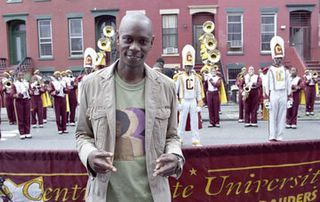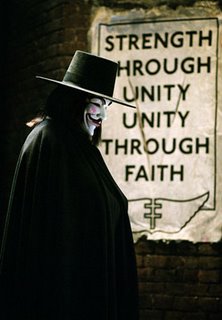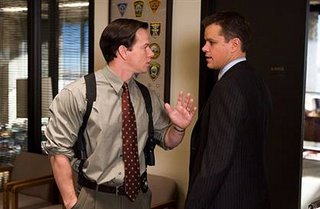Best Films of 2006
[UPDATED to include Notes on a Scandal, which I have just seen...That makes it a decidedly Anglophilic year for great filmmaking. 5 of the 10 films on my Best of the Year list now take place in part or entirely in Britain, and British actors and directors are all over the list. Could it be comeback time for the British film industry?]
As hard as I try, there are always movies each year that get away from me. Working in a DVD store, I had access to just about every Hollywood film of any interest to me whatsoever. So if a major American film didn't make this list, it's either because I had no interest in seeing it or I didn't think it was very good.
International cinema is a different story. We rented a lot of foreign films at the video store, but these don't usually hit DVD until they are a year or more out of date. So even if I got to see a great foreign film, it's usually not one from the actual year in question, invalidating it in terms of list-making. There are a few exceptions (one on the list proper), but I always regret not getting to put more international films on my End of the Year lists, so I wanted to mention this right up front. I'm certain that in 2007, I'll write posts about some films that would retroactively have made the Top Films list below.
Here are films that are getting a lot of award/Best of 2006 buzz which I have not managed to see. Bear this is mind when reading my actual list.
The Lives of Others, Volver, Flags of Our Fathers/Letters From Iwo Jima, Days of Glory, Dreamgirls, The Last King of Scotland, Venus, Catch a Fire, Little Children, Black Book, Curse of the Golden Flower, The Good Shepherd, Perfume: The Story of a Murderer, Melpocalypto, The Painted Veil, Blood Diamond, Stranger Than Fiction
Now on to my picks.
UN CERTAIN REGARD (Runners-Up):
A Scanner Darkly
Richard Linklater's first narrative film made with the painterly rotoscope animation style alienated mass audiences with its complicated, multi-tiered narrative and brown acid ambiguity. An animated hybrid of a '90s slacker/stoner comedy with a dystopian Phillip K. Dick adaptation couldn't have been designed with mass audiences in mind, though, right? Easily the year's best computer-generated film, and its trippiest head trip. (My pick for the best CG-animated family film for the year would be Monster House. In fact, that was the only other animated film this year I could even tolerate.)
13 (Tzameti)
The debut from Georgian director Gela Babluani is a gritty, intense study of the psychology of exploitation. Often read as an allegory for globalization, this story of a poor, desperate youth roped into a nihilistic underground gambling ring could stand in for any situation in which certain privileged individuals are given absolute power over others. Babluani's overall technique is admirable for a first-timer, but in particular I admired the somewhat Podovkian way he uses shot repetition to infuse certain images and objects (like a light bulb switching on) with inherent emotional qualities.
Find Me Guilty
A little-seen gem from early 2006, I'm pretty sure this Sidney Lumet courtroom comedy-drama suffered from America's justifiable skepticism about Vin Diesel movies. He's atypically solid here, as disarmingly likable (and real-life) gangster Jackie DiNorscio, serving as his own attorney in a major, multi-defendent mob trial. At first, the film feels like a docu-drama reworking of My Cousin Vinny, all shiny suits and goombah jokes, but it eventually morphs into a somewhat strident takedown of our court system and conventional notions of "justice," as well as a character study about a man torn between his essentially good nature and the violent criminals with whom he associates. Peter Dinklage does some outstanding supporting work here as a mob attorney that's certain to be overlooked this Oscar season, only because the film opened early in the year.
The Proposition
The Proposition relocates the spaghetti western from Spain (standing in for Mexico and the American West) to Australia, but leaves the genre's trappings pretty much intact. A sparse, largely unpleasant story about brothers set against one another, the film is buoyed by its expressive, dusty cinematography, sharp supporting work from Ray Winstone and John Hurt and screenwriter Nick Cave's dirge-like original folk songs.
Dave Chappelle's Block Party
Mos Def, Kanye West, Common, Erykah Badu, a reuinted Fugees and Dead Prez perform live in Brooklyn and mess around with Dave Chappelle and music video maestro Michel Gondry is there! But this isn't just a document of a notable recent event.
Dave struggles with conflicting emotions while putting together his dream concert, a project that seems to stem equally from his desire to share his favorite music with his fans and his guilt over joining the wealthy elite. It's all particularly compelling in light of his decision to quit his mega-hit TV show and skip the country a short time after the movie was shot. This probably would have made my Top Ten if the film included more footage of the performances themselves. A concert film should never cut away in the middle of a song, ever, no matter how interesting the interstitial scenes may be.
Marie Antoinette
Sofia Coppola approached the fact-based period drama as few American filmmakers have before. Rather than focusing on the painstaking historical recreations that generally distract such pursuits, turning compelling stories into the cinematic equivalent of AP European History notes, Coppola abandons all context, refashioning French history as the story of a naive girl making her way in a confusing world. It's an audacious choice, and one that did not win her many new fans in France and around the world, but it works remarkably well for the movie she actually wanted to make. Kirsten Dunst gave one of her few successful performances to date in Coppola's Virgin Suicides and does similarly sharp work here, capturing Marie's initial awe at and eventual consumption by the decadence of Versailles. And despite the hype, the use of contemporary, anachronistic music plays as a sly afterthought, a witty aside reminding us of the patriarchal universality of Marie's dilemma rather than the focus of the entire enterprise.
MY 10 FAVORITE FILMS OF 2006
10. V for Vendetta
As an action movie, V for Vendetta gets barely passing grades. It's sloppy, the first 10 minutes drag horribly and the cinematography as a whole is surprisingly static and stagey for a comic book adaptation. But in a year packed full of politically outspoken films, V made some of the most incisive, direct attacks on George W. Bush's America, and for that it deserves recognition. (Even the details, like Abu Ghraib clips on monitors in the background and the half-O'Reilly/half-Hitchens TV pundit, felt spot-on.)

The fanboys who complained that it abandoned Alan Moore's critique of Thatcher's England missed the point entirely; writers/producers the Wachowski Brothers and director James McTeigue clearly had very little interest in the specific politics and subtext of Moore's book. They simply saw in V a character wielding a corrupt and authoritarian government's propaganda as a weapon against them, and realized how easily this could be applied to the police state that is modern America. Guy Fawkes references and all. That it's such a perfect match is a testament both to the strength of Moore's imaginitive original book and the Wachowski's renewed vigor as screenwriters.
9. Casino Royale
No way I thought a Bond film would ever make a list of my favorite films in a given year. To be honest, I've never been that huge of a Bond fan, probably because no truly worthwhile entries have hit theaters in my lifetime.
Daniel Craig and Martin Campbell for once didn't try to simply transplant the same old character into a present-day action movie. Instead, they rethought the entire notion of Bond-ness. The immediate trappings of Ian Fleming's creation are there, from James' trademark tuxedos and taste in martinis to the elegant fuck bunnies attracted to him seemingly by scent. But Craig's character doesn't really share that much in common with the previous iterations. He's meaner, less self-aware and no longer impervious to pain or capable of dodging bullets.
Though much of the praise has to go to the screenwriters for reviving the franchise's long-dormant pulse and cynical cool, Martin Campbell just directs the hell out of the entire film. An early footchase, making use of the "free run" techniques previously featured in District B13, and a late gunfight in a sinking Venetian edifice, rely largely on practical effects and authentic stunt work, giving them a punchy immediacy that's far more watchable and fun than Hollywood's standard CGI-intensive, quick-cut summer blockbusters.
8. The Queen
Stephen Frears' The Queen melds a disarming comedy about England's anachronistic monarchy and a quietly devastating drama about aging and feeling suddenly irrelevant. It's rare to see a film dramatizing iconic events of the recent past (in this case, the immediate aftermath of Princess Diana's death), but even rarer to see a filmmaker recontextualize history into a tightly-coiled, dramatic narrative rather than simply recreating the past as it most likely occured. Frears seems uninterested in authoritatively relating the true story of Elizabeth II meeting Tony Blair (and there would be no way to know what the two of them discussed behind closed doors anyway), but instead uses them to explore ideas about tradition and the importance of symbols to the human character.
Helen Mirren's compassionate performance as Elizabeth II, who commands attention by saying and doing as little as possible, has justifiably attracted a lot of awards attention, but the casting in every major role is impeccable. Michael Sheen, who previously worked with Frears on a BBC film about Tony Blair, turns the Prime Minister into a crafty but baffled straight man while physically embodying the guy as well as could be imagined. He deserves a lot more recognition than he has yet received. James Cromwell as Prince Phillip and Alex Jennings as Prince Charles are likewise spot-on and very funny in their respective roles.
7. Notes on a Scandal
I'm biased against films with voice-overs generally because they are such a cop-out. A large part of the challenge of rendering daily life cinematically is the visual expression of inward emotion. Having a character tell you precisely what he or she is thinking via narration circumvents this process, either in a lazy attempt to avoid the hard work of subtle storytelling or to cover for a convoluted, nonsensical plotline.
I sense, however, that if more narrators were as scintillatingly evil and darkly charming as Barbara Covett, I'd get over my prejudice against talky, voice-over-heavy films rather quickly. Barbara's stridently sociopathic, bitterly cynical diary entries, read by Dame Judi Dench with an air of misanthropy and self-satisfaction that recalls Humbert Humbert, elevate what would otherwise be an earnest melodrama into a devastating exploration of panic and isolation. Patrick Marber's adaptation of Zoe Heller's novel bristles with sexual tension, but as in Mike Nichols' film of Marber's play Closer, Notes on a Scandal remains detached, coldly analyzing the human need for companionship and physical closeness with an anthropologist's eye. This is the National Geographic Channel of the perverted mind.
Dench so perfectly nails the odd jumble of Barbara's personality - the ability to appear compassionate while possessing no actual feelings, the seething hatred that pivots instantly into affection - that she seems quite natural and quotidian, despite the fact that nearly no one has a close personal friendship with anyone this vile. Cate Blanchett acquits herself well in an even trickier role, as the sympathetic schoolteacher who carries on an adulterous affair with a 15 year old boy.
6. Three Times
Largely discredited film theorist Siegfried Kracauer believed that the most cinematic types of plots were what he deemed "found stories." That is, stories that arose not from literature or the demands of a given genre, but from the chaotic, irrational business of daily human life. Realistic films, then, don't recreate human life in front of the capture. Ideally, they discover the hidden truths that are already expressed around us daily, but in ways that we can not immediately or directly experience.
 Taiwanese master Hou Hsiao Hsien is one of the few contemporary filmmakers to truly hew to Kracauer's (and in some respects, great French theorist Andre Bazin's) ideas about realism in storytelling. He makes films that aren't driven by premises or concepts, low or high. His films aren't particularly ideological or philosophical. He attempts to show life as it may be genuinely perceived by the human eye, to record scenes for posterity and to then scan and edit that footage in an effort to unearth deeper meanings and significance than we would typically derive were these events to happen in front of us (or to us) in reality.
Taiwanese master Hou Hsiao Hsien is one of the few contemporary filmmakers to truly hew to Kracauer's (and in some respects, great French theorist Andre Bazin's) ideas about realism in storytelling. He makes films that aren't driven by premises or concepts, low or high. His films aren't particularly ideological or philosophical. He attempts to show life as it may be genuinely perceived by the human eye, to record scenes for posterity and to then scan and edit that footage in an effort to unearth deeper meanings and significance than we would typically derive were these events to happen in front of us (or to us) in reality.In Three Times, the same two actors (Shu Qi and Chang Chen) play out three different love stories in three different time periods. The first story, set in the '60s, concerns a soldier who meets a cute girl in a pool hall and writes to her periodically. The 1911-set sequence, made in the style of a silent film but with synchronized singing, finds a businessman falling in love with an emotionally remote prostitute. The third sequence concerns an chronically unfaithful couple in modern-day Taipei.
I refer to them here as love stories because they each depict a man and a woman who share some sort of romantic connection, but Hsien never bothers to tell a standard movie love story. Usually, a couple meets and hits it off immediately, but then faces some complication or another keeping them apart.
Three Times presents largely ambiguous, wandering narratives about the nature of affection and the world's indifference to our inner desires. These narratives are inseparable from the material environment in which they play out. Hsien's stationary camera and extremely long takes force the audience's attention on the details of the settings, the subtle nuances of the performances and the music choices, all of which relate back to the respective time periods. (Like the deep focus shots in Orson Welles' Citizen Kane, many of Hsien's static panoramas defy us to follow the filmmaker's intention. Where are we supposed to be looking? What, if anything, is actually important about my having this viewpoint at this moment?)
Several "meanings" could be ascribed to the technique here. Is the film suggesting that, though the nature of human emotions may seem consistant, we are really just slaves to our environment and the specific sensory details of the world we occupy? Most of the lovers' dialogue, behavior and surroundings are dictated by the times in which they live. The modern couple converses via cell phone and text message, while the turn-of-the-century couple communicate through surruptitiously-passed notes. Each segment opens with a title card and a glimpse at some of the period's defining technology - a jukebox, a personal computer, a lantern.
Would the soldier be the enterpreneur if he had been alive at a different time? Or are these meant to be totally separate individuals linked only be their temporarily similar circumstances? Though the stories have relatively little to do with one another, some connections are possible. All the men are clients at businesses employing the women. (One barmaid, one courtesan and one performing artist).
These kinds of "explanations" can be satisfying to a certain extent. Certainly, there are many ideas whirling around the film that could make for an intriguing thesis. But the film's really more about taking time to observe. Not to watch, but to observe. To soak in these characters and their world, and to really notice the small gestures or half-heard background noises that we'd normally skip over on our busy way to the next task, conversation, meeting or errand. To see if, admist the chaos of 20th and 21st Century life, there might be a sensible, underlying Story to be discovered.
5. The Devil and Daniel Johnston
Daniel Johnston is a mentally unstable man from Austin, Texas who writes and records very strange, highly confessional pop songs. Jeff Feuerzeig's film clearly holds the man's musical ability in high regard, but generally refuses to descend into schmaltzy sentimentality. This is not a portrait of a "mad genius," whose insanity fuels his ability to Create, but a frank and affectionate consideration of one man's difficult struggle through life and how he has touched a multitude.
Daniel seems to feel things more deeply than most people. He's still haunted by the memory of a girl who broke his heart as a teenager. He's deathly afraid of the Devil, whom he views as a personal adversary. The fictional character to whom he most strongly identifies (and to whom he dedicates a number of songs) is Casper the Friendly Ghost, a lonely dead boy. While in a mental institution, he phones his manager and asks if he can become the new pitchman for Mountain Dew.
This raw, almost childlike openness is part of what give Daniel's songs their emotional heft. We can relate to them not because we all worship Casper the Friendly Ghost, or live in daily fear of our own mortality, but because Daniel's incapable of hiding his naked, needy humanity. It bleeds out of all his songs, and gives them an accessibility and impact that all the ironically-distant, theatrical Panic at the Discos and Fallout Boys out there can't begin to match.
Feuerzeig's film not only establishes Daniel's cred as an unheralded visionary, but challenges the audience with some complex and unanswerable questions about the nature of his music. If it's Daniel's mental illness that makes his music stand out, what does that say about the overall nature of artistic endeavor? Is it wrong for other Austin musicians, and the entire Indiesphere at large, to fetishize Daniel's madness, even if his notereity and flirtations with a real music career have brought him considerable joy?
Easily the best documentary I saw with 2006, The Devil and Daniel Johnston is among the greatest films ever made about a real, troubled artist. It's right up there with Werner Herzog's My Best Fiend and Terry Zwigoff's Crumb.
4. The Departed
Though Martin Scorsese has received most of the attention for his punchy, inventive direction, The Departed is the year's most tense, exciting and entertaining thriller because of William Monahan's savagely witty script. This film contains some of the most quotable dialogue since Glengarry Glen Ross, and the various twists and turns are surprising, timed to perfection and orchestrated beautifully.
Though he's been making great films all along, Scorsese hasn't worked with material that's this fertile and cinematic in many, many years. The gangster underworld of Boston feels of a piece with the other criminal communities Scorsese's camera has explored - the Jersey hideouts of Goodfellas or the Vegas counting rooms of Casino - but this time, the likable characters and musings about love, honor and loyalty serve are the sideshow. Scorsese buries some of his own mannerisms beneath Michael Mann-inspired cop drama theatrics, including the best straight-up action scenes he's ever shot.
 Alec Baldwin, Jack Nicholson and Mark Wahlberg are the standouts, each one turning in his respective best performance of the decade. Also notable are Ray Winstone as enforcer Mr. French, Vera Farmiga as a psychiatrist caught in the crossfire and Matt Damon, who's capable of doing really solid work when not phoning it in.
Alec Baldwin, Jack Nicholson and Mark Wahlberg are the standouts, each one turning in his respective best performance of the decade. Also notable are Ray Winstone as enforcer Mr. French, Vera Farmiga as a psychiatrist caught in the crossfire and Matt Damon, who's capable of doing really solid work when not phoning it in.3. INLAND EMPIRE
After giving it some thought, I think this movie is about an actress who becomes so emotionally invested in a film character, she actually enters a pan-dimensional portal which causes her to experience multiple tragedies at once. Propelled from her own past traumas to the traumas of her character to the traumas lurking in her future, she becomes trapped in a vicious cycle of confused love, nightmarish cruelty and narrowly escaped redemption.
Or something like that. Lynch has not so much directed a film as crafted an experience, one that's difficult to summarize and even more difficult to shake off. Unfortunately, most Americans don't want to pay $10 to spend 3 hours being bewildered and frightened, so only a small fraction of our national population will get the opportunity to take in INLAND EMPIRE the way it was surely meant to be seen, in a theater full of other confused, creeped out people.
Very few filmmakers would have the stones to put something this inscrutable, lengthy and, quite frankly, terrifying, out there for the masses to see. Sure, Chris Cunningham directed that freaky Rubber Johnny short, but he didn't open it at the Crest and stand outside giving away free passes to senior citizens, did he? This is Lynch at his most immediate, audacious and vital, something truly original and refreshing in a year overstuffed with rehashes.
2. Children of Men
When I initially saw Alfonso Cuaron's immense, sweeping masterpiece, I got kind of caught up in the specifics of the political analogy and missed the big picture. But I've come to my senses now and realized this is the single most important, most on-target and best directed fictional film of 2006. A riveting action film, a fiery rebuke of contemporary American policies and a thoughtful sci-fi adaptation all delivered in one stylish, fast-paced, extraordinarily gripping 2 hour package.
Cuaron's film ostensibly depicts the Britain of 20 years hence. Humans have become infertile for some reason, which has led to widespread panics, rioting and anarchy. Britain, we understand, has barely held together under authoritarian rule, which the rest of the planet has essentially gone to shit. Brave hero Clive Owen is soon enlisted to protect the world's only known pregnant woman, who must be delivered to The Human Project before the government or the radical lefitsts can get a hold of her.
But it's all just an extended metaphor for contemporary America. The fascistic police enforce brutal immigration laws, scapegoating refugees and hoarding them into squalid, overpopulated camps to die from exposure and starvation. Random explosions and terrorist bombings give everyone a constant sense of unease. Constant marketing encourages people to conform, even in death. Sound familiar?
Which brings me to my problem with the film's analogy. It posits, essentially, that we live in a ruined world over which two groups are battling - the authoritarian government and bands of lefty terrorists plotting a Communist revolution.
Seriously. Cuaron's film seems to argue that these two forces are equal and in opposition, that we all are simply caught in the middle of a larger war about which we are only partially aware. The government, you see, would want to get their hands on a new baby for use as a propagandizing tool, to extoll their own virtue and the citizenry's need for their benevolent iron fist. And the Commie radicals want the baby to instigate their imaginary revolucion, to unite the refugees against their captors.
Oh please. To look at contemporary America and see the Bush Administration and ANSWER as equal and opposing positions that are squeezing the American public between the brute strength of their countervailing ideologies is to be a complete fucking idiot. There's only one group with any power that's fucking up America's future from 2000-2006, and it ain't fucking PETA. A customer came into the store and actually argued this point with me the other day.
"Who were the evil communist radicals supposed to represent," I queried. "Whose fundamentalist ideology and opportunistic quest for power pose as noxious a threat to America's future as BushCo?"
His response? "The ACLU." That's what we're dealing with here...
Anyway, I still think that's an essential flaw in the viewpoint of Children of Men. But it's essentially a minor point. Otherwise, the film is top drawer. In particular, Cuaron and Emmanuel Lubieski have concocted a brilliant technique for shooting their considerable action set pieces. Using a handheld camera, essentially simulating documentary war footage, they place the viewer into the middle of the action in a very immediate, visceral manner. Several extended shots (some seeming to last several minutes) develop an uneasy tension as they unfold. Even if the viewer doesn't consciously notice that there have been no cuts, the unbroken perspective on chaotic scenes of warfare can't help but pull them in.
As a sober look at the sad reality of our decaying civilization, Children of Men really can't receive enough praise. Regrettably marketed by a clueless studio as a chase movie, it's more like a thinly-whispered prayer for some kind of hope. Surely, Cuaron timidly suggests, in the midst of all this horror, there must be some way out for humanity. Right?
1. Borat
So, Children of Men was one artist's metaphorical take on modern American life. In Borat, Sacha Baron Cohen spares us the allegory and simply holds up a mirror. He hides himself behind a moustache to show us who we are. Sure, it's funny, but only because it's so fucking ugly. Those people lucky enough to be born in the wealthiest, most privileged, most isolated nation on the Earth have of course turned bitter, petulant and utterly divorced from reality.
You can tell Borat is the best film of the year because it's the Most Sued. Any movie that's outrageous enough to inspire more than a dozen individual lawsuits must by definition be among the year's best. I first saw the film at a focus group screening in February, and suspected that most of the material would never make it to mainstream American movie screens. Two naked men wrestling in front of a convention full of businessmen? Frat boys fondly dreaming of the day when the powers that be finally see fit to reinstitute slavery? A grown man handing his own bowel movement to a woman wrapped in a napkin?
In fact, the only scene I saw that did not make it into the finished film concerned Borat infiltrating a porno set, and it has already shown up on more than one website. But Cohen's daring in terms of nudity and physical comedy is outmatched by his willingness to show the unadulterated truth about American's ignorance of foreign cultures, etiquette, history and their own proposed belief systems. Several reviews of the film have noted that he frequently repeats certain jokes and one-liners (particularly concerning his prostitute sister and retarded brother, Bilo). This is true but utterly beside the point. The joke aren't Borat's little sayings (though many are quite funny). The joke is that such an obvious fraud not only convinces gullible Americans, but inspires them to reveal their darkest prejudices, childish belief systems and xenophobia.
 Consider one of my favorite scenes, when Borat stumbles into a Pentacostal church service and begs for Christ's forgiveness. This scene gets overlooked, because it's not really the film's most fall-down funny (plus, it comes pretty soon after the naked wrestling, when audiences are essentially laughed-out and exhausted for a brief period). But it's clearly one of the most subversive scenes in any 2006 American film. Here we have an actor playing a goofy, sketch-comedy-style version of a Muslim, making a joke out of professing his devotion to Christianity.
Consider one of my favorite scenes, when Borat stumbles into a Pentacostal church service and begs for Christ's forgiveness. This scene gets overlooked, because it's not really the film's most fall-down funny (plus, it comes pretty soon after the naked wrestling, when audiences are essentially laughed-out and exhausted for a brief period). But it's clearly one of the most subversive scenes in any 2006 American film. Here we have an actor playing a goofy, sketch-comedy-style version of a Muslim, making a joke out of professing his devotion to Christianity.There's no two ways about it. Cohen is making the Pentacostal religion into a joke. "Watch this! I'll make these idiots believe I'm really converting to their crazy, stupid faith! See, they totally buy it! They think I'm speaking in tongues! What a bunch of idiots!" Other films make poke sidelong fun at certain Christians, but I can't think of another film that holds an entire strain of the religion up for such direct ridicule. Bravo, I say.
So those are my best films of the year. I've noticed that a lot of critics and websites chose Jean-Pierre Melville's 1964 classic Army of Shadows as their film of the year. I saw this film theatrically during its American rollout this past year, and it's undoubtedly brilliant. (I reviewed it here.)
But to call it the Best Film of 2006 is the most snooty, ridiculous copout imaginable. "Ooooh, look at me. I'm selecting this old French movie as the Best Film of 2006, because there's simply no modern movies that appeal to my sophisticated Old World pallatte! Now where are my Alain Resnais DVD's! I'm in the mood for some light entertainment!"



